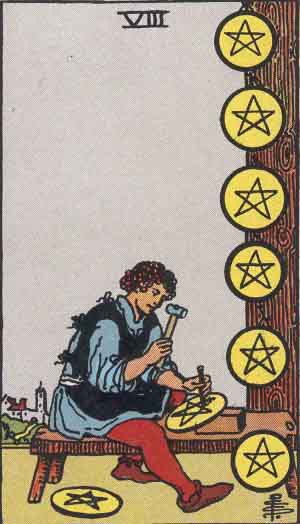The creative and magnetic force of the Wands suit is well suited to the 8th Sephirah. Hod's expansive and searching nature thrives and grows in its warmth. It can signify an artistic breakthrough, or a sudden inspiration that helps the Querent overcome a long-standing problem. (This is especially true if it falls near Aces or cards of inspiration like the High Priestess or 6 of Swords). Since Mercury is the Divine Messenger this card often comes into the Querent's life as a message -- the arrival of a long-delayed acceptance letter or job offer, an e-mail from an old flame that rekindles a past romance. If the Querent is waiting on news the 8 of Wands suggests an answer is on the horizon.
The 8 of Wands comes quickly and leaves just as fast: it is more akin to a gas explosion than to the forest fire's insatiable conflagration. Its effect can be profound but it is generally brief. That is not to say that it cannot trigger a chain reaction if the Querent is not prepared to contain the blast. Tarot spreads are ecosystems which illuminate the interplay between microcosm and macrocosm. A sudden shock in any single region will ripple through the whole reading, with unpredictable aftereffects coming into play well after it has faded.
 The 8 of Wands often brings benefits. Waite attributed mostly positive meanings to this card, including "speed toward an end which promises assured felicity" and "the arrows of love." But its blessing require immediate action on the Querent's part. This is a limited time offer: hesitate and you'll miss it. (This is especially true if you find this card opposed or crossed by burdensome heavy cards like the 7 of Pentacles or 10 of Wands). Yet if it falls in a hostile or difficult position, it can also signify a situation where caution and discretion are in order -- a case where one must "hurry up and wait." But even where it points to problems the 8 of Wands suggests they will be brief.
The 8 of Wands often brings benefits. Waite attributed mostly positive meanings to this card, including "speed toward an end which promises assured felicity" and "the arrows of love." But its blessing require immediate action on the Querent's part. This is a limited time offer: hesitate and you'll miss it. (This is especially true if you find this card opposed or crossed by burdensome heavy cards like the 7 of Pentacles or 10 of Wands). Yet if it falls in a hostile or difficult position, it can also signify a situation where caution and discretion are in order -- a case where one must "hurry up and wait." But even where it points to problems the 8 of Wands suggests they will be brief.











